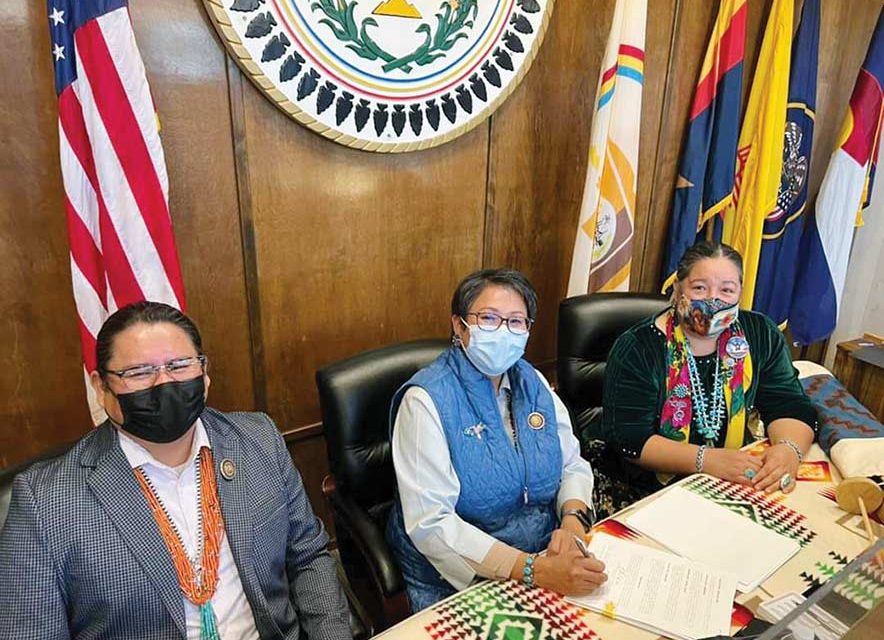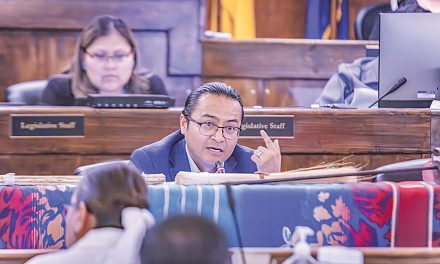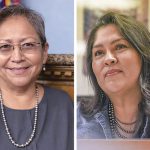
‘The Peoples’ money’: Hardship payments of $2,000 per adult, $600 for children OK’d

Courtesy photo | Speaker’s office
On Monday delegates certify the Hardship Assistance resolution before sending it across the street to President Jonathan Nez. Delegates who played major roles in the passage of the resolution are, left to right, Nathaniel Brown, Eugenia Charles-Newton and Amber Kanazbah Crotty.
By Rima Krisst and Krista Allen
Navajo Times
WINDOW ROCK
Checks ranging from $600 to $2,000 will land in mailboxes of Diné citizens – soon.
Surrounded by division directors inside the president’s office, President Jonathan Nez signed the Navajo Nation Council resolution (CD-62-21), which approves $557 million in American Rescue Plan Act funds for Hardship Assistance to about 250,000 Diné citizens.
T’áá Dinék’ehjígo, Nez said, “The Nation received over $2 billion from the U.S. Treasury. We’ve allocated $557 million for Hardship Assistance, for our people.”
Nez added the payment checks would help families who are struggling, among other things.
“Use this money wisely, please, my relatives,” he said. “Buy things you need on our Nation. Yes, we have some of our people who are living off of the Nation and they cannot return home. Please, put some money away for later use. We are still amid a pandemic. Please prepare for possible infection.”
Nez said there will be some remaining funds of the $2.1 billion, and that will go toward other needs of the Nation such as broadband, water and wastewater projects, and powerlines.
“I’m thinking about our people,” said Flora Slim, originally from Holbrook, Arizona, but who lives in Mesquite, Nevada.
Slim said when she receives her Hardship payment, she’ll be paying some overdue bills.
“Thank you for this (Hardship Assistance),” she told the Navajo Times on Wednesday afternoon.
Slim added that she’s worried about the Diné individuals who haven’t received the first round of relief checks and the young men and women residing overseas or serving in the military.
“We’re all struggling,” she added.
Dá’deest?’in Hótsaa Delegate Paul Begay applauded Nez for signing the resolution that the 24-member Council pushed for their constituents.
“The Hardship Assistance belongs to the people,” Begay said in an interview with the Times. “They (the Diné) wanted it. We’re in the middle of the winter. They need funds right now to make it through the winter season.”
Begay added that he knows many Diné families across Diné Bikéyah need food and water to survive the below zero temperatures. He is encouraging people to put some of their funds away for a rainy day.
“Rest assured, our Navajo people can make it through the winter and through COVID-19,” Begay added.
So, when are people receiving checks?
Jared Touchin, spokesman for the president’s office, said there will be a townhall tomorrow evening to provide more information about the Hardship Assistance, including the process, timeline, and questions will be answered.
COVID losses
In a victory for all Diné who’ve suffered life-changing hardship and losses due to COVID-19, the Navajo Nation Council on Dec. 29 passed emergency bill (No. 263-21), sponsored by Delegate Amber Kanazbah Crotty, approving $557 million in Navajo American Rescue Plan Act funds for Hardship Assistance.
This is where the payments of $2,000 for adults and $600 for minors come from.
Delegates voted 18 in favor and two opposed.
“This resolution sends a clear message that our focus is on the people over projects,” Crotty said. “The Hardship can’t wait. ARPA was signed in March. We got the money in May. The people need relief.”
The $557 million appropriated for hardship represents more than a quarter of the $2.1 billion in ARPA Fiscal Recovery Funds given to the Navajo Nation by the federal government.
Crotty said the Navajo people should not have to suffer one more day without knowing how their government will assist them as they suffer from grief, stress, and financial hardship.
“Navajo leaders continue to hear directly from people who are displaced, suffering and vulnerable,” Crotty said. “Our intention for this emergency legislation is to provide direct winter relief to families ….”
She thanked the people for reaching out to delegates to share their experiences and delegates for coming together on their behalf.
“We have all been affected by the devastating impacts of COVID-19 and the people appreciate their Council Delegates standing up for them now,” she said.
Nez urges people to use the funds for essential items and services that will help protect and prepare their homes and families.
“We love our Diné people and we do not want any more of our people to lose their lives to this modern-day monster known as COVID-19,” he said. “We know that our elderly parents, grandparents, youth, students, veterans, and many others are in need of a hand up. This is the Navajo peoples’ money and we hear your voices.”
‘Uplift lives’
After more than six hours of debate during Wednesday’s special session, Crotty’s bill that originally proposed $207 million for Hardship Assistance ($600 per person), due to the 10% cap set by Council (in Res. CJY-41-21), was amended to waive the cap and increase the amounts.
Delegate Eugenia Charles-Newton, who has been advocating for hardship assistance since June, served as pro tem speaker for the special session hosted virtually in Window Rock.
“We must have compassion in our hearts and listen directly to the people who need immediate help,” Charles-Newton said. “We have taken action now in the best interest of our grandmas, grandpas, our single parents, and our students who need support.”
Charles-Newton said the intention is to provide direct relief to all families so they can pay for their water and electric bills, groceries, car payments, hay for livestock and more.
Delegates for the most part agreed that it was past time that the people were given the immediate assistance they need, especially in the face of a new COVID-19 surge, driven by the Delta and Omicron variants, and increased expenses brought on by the winter season.
The amendment to increase the hardship amount from $600 to $2,000 for adults was proposed by delegates Nathanial Brown and Charlaine Tso, and Crotty supported them.
Brown said that the Navajo people have been hurt on a physical, emotional, and spiritual level from the “monster” called COVID-19.
“I think our people have suffered so much and we continue to suffer, especially those who are barely making ends meet, who are just surviving,” Brown said. “The emergency legislation will uplift the lives of so many vulnerable relatives, many of whom are homeless on the streets today.”
He said many people are also coping with long-term health problems brought on by having COVID-19 and can no longer work.
Additionally, rates of domestic violence, suicide and depression have gone up on Navajo due to the impacts of the pandemic, said Brown.
“With this money, I know that will help them a little bit,” he said. “I think it can give them some hope.”
‘We need to spend it’
Only delegates Jamie Henio and Raymond Smith voted against the bill.
While they supported the original $600 payments proposed in the original bill, they said they couldn’t support the higher amounts.
Henio, Smith and some other delegates expressed concern that the increase in Hardship payments would take away from long-term infrastructure projects, some of which are included in the president’s office’s proposed ARPA bill (No. 257-21).
Crotty’s bill split off the Hardship proposal from the executive branch bill that would allocate $1.16 billion for infrastructure projects.
“COVID is still here and creating chaos in families,” Crotty said. “There’s still a strong need to help at every individual, household level, and this funding allows for that.
“I know it’s a challenge, because we also need infrastructure,” she added, “but we need to make sure that our people have a sound well-being.”
The Hardship resolution states that the “financial devastation” brought on the Navajo people by the COVID-19 pandemic “has risen to emergency levels,” which makes it vital that they be provided immediate financial assistance to recover from the COVID-19 pandemic and mitigate exposure to future variants.
“This increase in the Hardship will also help in spending down that over $2 billion that we have sitting in the bank,” Brown said. “What we learned from CARES is that we need to spend it.”
Besides that, Brown said the ARPA funds are “the Peoples’ money.”
“Because of their census numbers, that’s how we got the money,” he said. “It’s legally theirs.”
Delegate Charlaine Tso said many Diné families need supplemental financial relief, especially those who live without running water or electricity.
“These ARPA funds belong to our people, their chapters, and their communities,” she said. “Let them spend this money as they like, it is theirs, and the Navajo government is now acting on their behalf.”
‘In this together’
On March 11, 2021, President Joe Biden signed the $1.9 trillion American Rescue Plan Act of 2021 to help the country recover from the severe health and economic impacts of the COVID-19.
The bill included $20 billion in Fiscal Recovery Funds for the 574 federally recognized tribes, which were meant to be used to respond to the COVID-19 public health emergency and its negative economic impacts.
For its share, the Navajo Nation received $2.079 billion with its first allocation of $1.86 billion on May 28, based on certified enrollment data, and an additional $217.9 million on Aug. 16, based on tribal employment data.
On Monday, Pro Tem Speaker Charles-Newton certified the Hardship resolution with Crotty and Brown in the Council Chamber in Window Rock.
“We have done all that we can to help our Navajo people,” Charles-Newton said. “Now it lies in the hands of President Nez.”
She encouraged Nez to stand “on the right side of history” by signing the bill, which he did the next day.
“If President Jonathan Nez signs this emergency legislation into law, the Navajo Nation Council will work with the executive branch to invest over $557 million in direct hardship assistance checks to thousands of Navajo people,” Speaker Seth Damon said. “This is their money allocated for direct COVID-19 relief.”
Resources and Development Chairman Rickie Nez applauded the “historic action” taken by the Navajo Nation Council by passing the emergency legislation.
“The outcry from our Navajo people needing immediate assistance was loud and clear,” Rickie Nez. “We did the right thing for hundreds of families.”
Individuals who applied through the CARES Hardship Assistance program will not have to reapply and check disbursements will follow the financial process previously approved by the controller’s office. More information about the ARPA hardship payments will be forthcoming from Acting Controller Elizabeth Begay.
“I hope the people are able to see that the Nation’s leadership is doing everything that they can, that the reason why we take so long debating is that we have to be very careful,” Brown said.
“I think in this pandemic,” he said, “the greatest investment is in our people and to make sure that they’re going to fight for the next day… we’re all in this together.”
Information: www.nnooc.org
As a public service, the Navajo Times is making all coverage of the coronavirus pandemic fully available on its website. Please support the Times by subscribing.
How to protect yourself and others.
Why masks work. Which masks are best.
Resources for coronavirus assistance








 Highway 264,
Highway 264, I-40, WB @ Winslow
I-40, WB @ Winslow